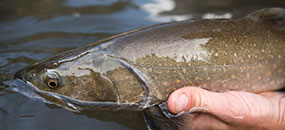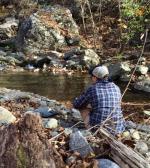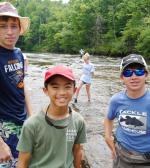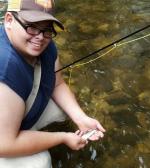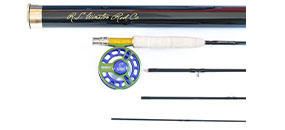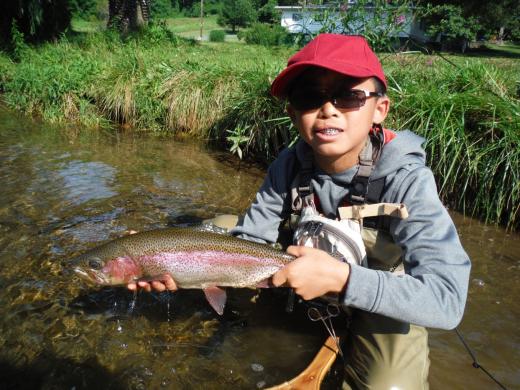We think that Andrew D's essay really speaks for itself--in telling his story, he tells the TU story.
---
Camp: NJ Coldwater Conservation Camp
TU Chapter: Central Jersey
Favorite River: The South Branch of the Raritan River
Thoughts on being outside: What I enjoy most about being outside is how beautiful and peaceful everything is. When you are standing in a river, the only sounds you hear are birds singing and rushing water. The sound of rushing water is mesmerizing, and a trout tugging at the end of your line is one of the greatest things I’ve ever experienced. Seeing the vibrant colors on a wild trout just adds to the beauty of the environment that they inhabit.
Camp Essay
by Andrew D
Six years ago, when I was spin fishing at one of my favorite local ponds I saw a man swinging a thick orange line through the air with a long rod. Although it looked like a weird way of fishing, I was interested. The man caught me staring at him and invited me over to try a cast. After a quick lesson on casting, I was making short roll casts into the pond. I remember the simple advice he gave me, “You want the line to land straight, and you don’t want it to land in a pile”. He told me “What I am doing is called fly fishing, and it really isn’t that hard.”
I had been successful catching bluegills and other panfish, but I eventually wanted to catch the elusive trout. But after struggling to catch trout, research showed another method of catching trout: with a fly rod. My dad bought me my first fly rod soon after. I read every article and book about fly fishing I could get my hands on, and I came across terms that I never thought I would understand. I read about all the different fly patterns, techniques, and casting styles. For hours I practiced casting in my backyard. I was ecstatic when I caught my first bluegill on a fly rod. All my work paid off, and my fly fishing journey began.
My dad signed me up for a guided trip with Brian Cowden, a conservationist. He guided me on the Musconetcong River, at a spot that he helped restored. The restored water was amazing! There were deep runs, and long pools. The water was cold, clean, and flowing fast. And best of all, there was plenty of trout! We caught fish, but more importantly he showed me what being a conservationist was about, the kind of work they did, and he even told me about the Trout Unlimited camp he helped run. I still thought too much expertise and experience was needed to be a conservationist, so I didn’t think too much about becoming one. Yet I was interested in the conservation camp. It seemed like a great time to learn about conservation, and to make new friends. So I decided to try something new.
When I arrived at camp, I was amazed by the beautiful scenery and placid waters within the campgrounds. The camp was located in Stokes State Forest in a picturesque campground with small red cabins, and a large lake for fishing. The campus was completed with a vast forest and the headwaters of a trout stream that ran through it. The classes introduced us to water ecology, conservation, aquatic insects, and how all these related back to fly fishing. The counselors and instructors were patient and helpful, especially with all of my questions. Over time I saw how sensitive the environment is to pollution, and how conservationists help “bring back” a good and clean environment. We seined the nearby pond, and also sampled the nearby river for aquatic insects. We discovered stoneflies, mayflies, caddis flies, and even huge hellgrammites living beneath the rocks. There was an electrofishing demonstration where biologist shocked the water so they could inspect the different fish living in the stream. They even found a nice wild brook trout living in the stream! Instructors helped improve my cast, I was taught how to tie new flies, and how to catch bass on a fly rod. Yet throughout all this learning, I was able to joke around with my new friends, and we had plenty of fishing time. I even caught my first catfish on a fly rod!
Going to this Trout Unlimited camp has inspired me to become a conservationist, something I would have never considered before conservation camp. Most importantly, I learned that it is not hard to become a good conservationist. Attending small restoration projects and streamside cleanups are just as great as doing a great stream restoration on a stretch of water. Yes, large stream restorations are very beneficial to the environment, but trying your hardest and doing what you can to help the environment is what really matters. Now I have an even greater respect for conservationists, and I can be a conservationist just by using my knowledge and skills. Before camp I thought I had discovered a lot about fly fishing: I fly fished for trout, I tied my own flies, and I caught trout. But now I know that conservation and water ecology play a part in being a good fisherman. One of the instructors gave me this memorable advice, “It doesn’t matter how big the project is; what really matters is whether you did what you could to help”.


